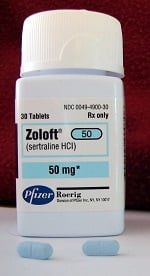
Antidepressants have long been linked to an increased risk of birth defects, with companies fighting claims that the meds cause serious issues in newborns if women take the drugs during pregnancy. Now, a new British Medical Journal study shows that only some of the drugs turn up risks of birth defects, dealing a spate of good news to companies making the products.
As The Wall Street Journal reports, a team of U.S. and Canadian researchers led by the Centers for Disease Control and Prevention (CDC) analyzed data from 17,952 mothers of infants with birth defects and 9,857 mothers of infants without birth defects born between 1997 and 2009. The scientists found a connection between Eli Lilly's ($LLY) Prozac and heart and skull defects, and a link between GlaxoSmithKline's ($GSK) antidepressant Paxil and defects of the heart, brain and skull.
But for other drugs in the same class--selective serotonin reuptake inhibitors (SSRIs)--the researchers did not turn up any links to birth defects, including Pfizer's ($PFE) Zoloft and Forest Laboratories'--now Allergan's ($AGN)--Celexa and Lexapro. In the past, researchers have reported associations between Zoloft and birth defects. So the fact that none appeared in this study is "reassuring," the team said in its findings.
And there is only a small increase in risk that babies will develop the flagged side effects if mothers take GSK's Paxil, the researchers added. The risk of brain and skull deformation in infants would be 7 in 10,000, for example, up slightly from two in 10,000 among women who did not take the drug.
The findings bode well for Pfizer, as the company continues to dispute claims that Zoloft is linked to birth defects in infants. Last month, Pfizer won two legal battles when juries in St. Louis and Philadelphia found the company wasn't liable for heart problems in children whose mothers took Zoloft while pregnant. But the pharma giant still faces a raft of claims over the med, with hundreds of suits alleging Zoloft caused heart abnormalities in babies born to women who took the drug during pregnancy.
In 2010, GSK shelled out more than $1 billion to settle hundreds of lawsuits claiming Paxil increased the risk of birth defects, putting most of that legal drama behind it. But in 2012, a court in Canada approved a class-action case that made similar claims, opening the door for a new round of investigations into the drug.
- read the WSJ story (sub. req.)
- here's the BMJ study
Special Report: The top 15 pharma companies by 2014 revenue - Pfizer - GlaxoSmithKline